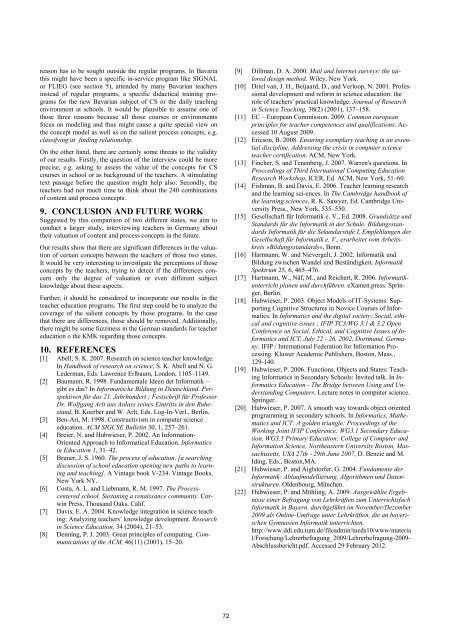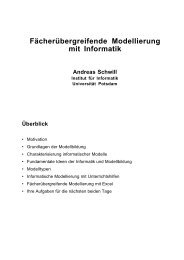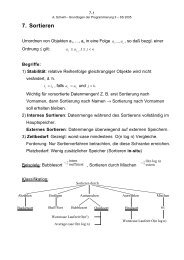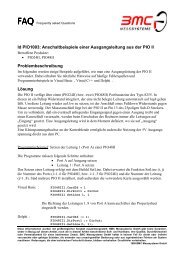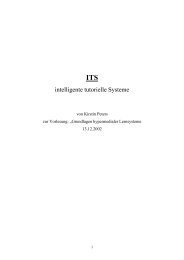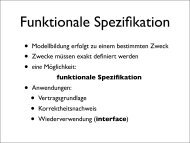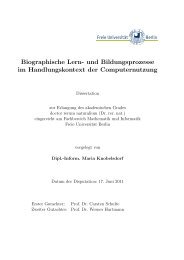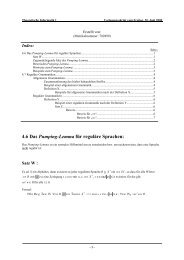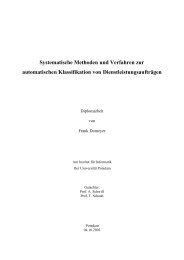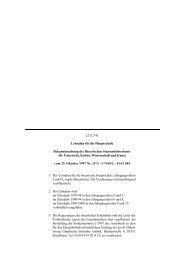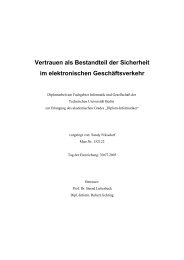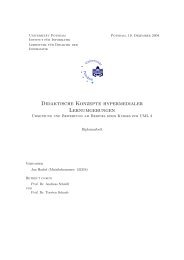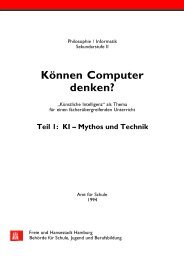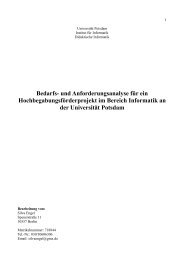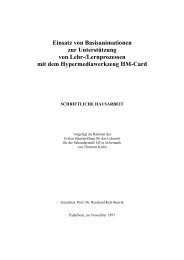Maria Knobelsdorf, University of Dortmund, Germany - Didaktik der ...
Maria Knobelsdorf, University of Dortmund, Germany - Didaktik der ...
Maria Knobelsdorf, University of Dortmund, Germany - Didaktik der ...
Create successful ePaper yourself
Turn your PDF publications into a flip-book with our unique Google optimized e-Paper software.
eason has to be sought outside the regular programs. In Bavaria<br />
this might have been a specific in-service program like SIGNAL<br />
or FLIEG (see section 5), attended by many Bavarian teachers<br />
instead <strong>of</strong> regular programs, a specific didactical training programs<br />
for the new Bavarian subject <strong>of</strong> CS or the daily teaching<br />
environment at schools. It would be plausible to assume one <strong>of</strong><br />
those three reasons because all those courses or environments<br />
focus on modeling and thus might cause a quite special view on<br />
the concept model as well as on the salient process concepts, e.g.<br />
classifying or finding relationship.<br />
On the other hand, there are certainly some threats to the validity<br />
<strong>of</strong> our results. Firstly, the question <strong>of</strong> the interview could be more<br />
precise, e.g. asking to assess the value <strong>of</strong> the concepts for CS<br />
courses in school or as background <strong>of</strong> the teachers. A stimulating<br />
text passage before the question might help also. Secondly, the<br />
teachers had not much time to think about the 240 combinations<br />
<strong>of</strong> content and process concepts.<br />
9. CONCLUSION AND FUTURE WORK<br />
Suggested by this comparison <strong>of</strong> two different states, we aim to<br />
conduct a larger study, interviewing teachers in <strong>Germany</strong> about<br />
their valuation <strong>of</strong> content and process concepts in the future.<br />
Our results show that there are significant differences in the valuation<br />
<strong>of</strong> certain concepts between the teachers <strong>of</strong> those two states.<br />
It would be very interesting to investigate the perceptions <strong>of</strong> those<br />
concepts by the teachers, trying to detect if the differences concern<br />
only the degree <strong>of</strong> valuation or even different subject<br />
knowledge about these aspects.<br />
Further, it should be consi<strong>der</strong>ed to incorporate our results in the<br />
teacher education programs. The first step could be to analyze the<br />
coverage <strong>of</strong> the salient concepts by those programs. In the case<br />
that there are differences, those should be removed. Additionally,<br />
there might be some fuzziness in the German standards for teacher<br />
education o the KMK regarding those concepts.<br />
10. REFERENCES<br />
[1] Abell, S. K. 2007. Research on science teacher knowledge.<br />
In Handbook <strong>of</strong> research on science, S. K. Abell and N. G.<br />
Le<strong>der</strong>man, Eds. Lawrence Erlbaum, London, 1105–1149.<br />
[2] Baumann, R. 1998. Fundamentale Ideen <strong>der</strong> Informatik –<br />
gibt es das? In Informatische Bildung in Deutschland. Perspektiven<br />
für das 21. Jahrhun<strong>der</strong>t ; Festschrift für Pr<strong>of</strong>essor<br />
Dr. Wolfgang Arlt aus Anlass seines Eintritts in den Ruhestand,<br />
B. Koerber and W. Arlt, Eds. Log-In-Verl., Berlin.<br />
[3] Ben-Ari, M. 1998. Constructivism in computer science<br />
education. ACM SIGCSE Bulletin 30, 1, 257–261.<br />
[4] Breier, N. and Hubwieser, P. 2002. An Information-<br />
Oriented Approach to Informatical Education. Informatics<br />
in Education 1, 31–42.<br />
[5] Bruner, J. S. 1960. The process <strong>of</strong> education. [a searching<br />
discussion <strong>of</strong> school education opening new paths to learning<br />
and teaching]. A Vintage book V-234. Vintage Books,<br />
New York NY.<br />
[6] Costa, A. L. and Liebmann, R. M. 1997. The Processcentered<br />
school. Sustaning a renaissance community. Corwin<br />
Press, Thousand Oaks, Calif.<br />
[7] Davis, E. A. 2004. Knowledge integration in science teaching:<br />
Analyzing teachers’ knowledge development. Research<br />
in Science Education, 34 (2004), 21–53.<br />
[8] Denning, P. J. 2003. Great principles <strong>of</strong> computing. Communications<br />
<strong>of</strong> the ACM, 46(11) (2003), 15–20.<br />
72<br />
[9] Dillman, D. A. 2000. Mail and Internet surveys: the tailored<br />
design method. Wiley, New York.<br />
[10] Driel van, J. H., Beijaard, D., and Verloop, N. 2001. Pr<strong>of</strong>essional<br />
development and reform in science education: the<br />
role <strong>of</strong> teachers' practical knowledge. Journal <strong>of</strong> Research<br />
in Science Teaching, 38(2) (2001), 137–158.<br />
[11] EC – European Commission. 2009. Common european<br />
principles for teacher competences and qualifications. Accessed<br />
10 August 2009.<br />
[12] Ericson, B. 2008. Ensuring exemplary teaching in an essential<br />
discipline. Addressing the crisis in computer science<br />
teacher certification. ACM, New York.<br />
[13] Fincher, S. and Tenenberg, J. 2007. Warren's questions. In<br />
Proccedings <strong>of</strong> Third International Computing Education<br />
Research Workshop, ICER, Ed. ACM, New York, 51–60.<br />
[14] Fishman, B. and Davis, E. 2006. Teacher learning research<br />
and the learning sci-ences. In The Cambridge handbook <strong>of</strong><br />
the learning sciences, R. K. Sawyer, Ed. Cambridge <strong>University</strong><br />
Press., New York, 535–550.<br />
[15] Gesellschaft für Informatik e. V., Ed. 2008. Grundsätze und<br />
Standards für die Informatik in <strong>der</strong> Schule. Bildungsstandards<br />
Informatik für die Sekundarstufe I. Empfehlungen <strong>der</strong><br />
Gesellschaft für Informatik e. V., erarbeitet vom Arbeitskreis<br />
»Bildungsstandards«, Bonn.<br />
[16] Hartmann, W. and Nievergelt, J. 2002. Informatik und<br />
Bildung zwischen Wandel und Beständigkeit. Informatik<br />
Spektrum 25, 6, 465–476.<br />
[17] Hartmann, W., Näf, M., and Reichert, R. 2006. Informatikunterricht<br />
planen und durchführen. eXamen.press. Springer,<br />
Berlin.<br />
[18] Hubwieser, P. 2003. Object Models <strong>of</strong> IT-Systems: Supporting<br />
Cognitive Structures in Novice Courses <strong>of</strong> Informatics.<br />
In Informatics and the digital society: Social, ethical<br />
and cognitive issues ; IFIP TC3/WG 3.1 & 3.2 Open<br />
Conference on Social, Ethical, and Cognitive Issues <strong>of</strong> Informatics<br />
and ICT, July 22 - 26, 2002, <strong>Dortmund</strong>, <strong>Germany</strong>.<br />
IFIP / International Fe<strong>der</strong>ation for Information Processing.<br />
Kluwer Academic Publishers, Boston, Mass.,<br />
129‐140.<br />
[19] Hubwieser, P. 2006. Functions, Objects and States: Teaching<br />
Informatics in Secondary Schools: Invited talk. In Informatics<br />
Education - The Bridge between Using and Un<strong>der</strong>standing<br />
Computers. Lecture notes in computer science.<br />
Springer.<br />
[20] Hubwieser, P. 2007. A smooth way towards object oriented<br />
programming in secondary schools. In Informatics, Mathematics<br />
and ICT: A golden triangle: Proceedings <strong>of</strong> the<br />
Working Joint IFIP Conference: WG3.1 Secondary Education,<br />
WG3.5 Primary Education; College <strong>of</strong> Computer and<br />
Information Science, Northeastern <strong>University</strong> Boston, Massachusetts,<br />
USA 27th ‐ 29th June 2007, D. Benzie and M.<br />
Iding, Eds., Boston,MA.<br />
[21] Hubwieser, P. and Aiglstorfer, G. 2004. Fundamente <strong>der</strong><br />
Informatik: Ablaufmodellierung, Algorithmen und Datenstrukturen.<br />
Oldenbourg, München.<br />
[22] Hubwieser, P. and Mühling, A. 2009. Ausgewählte Ergebnisse<br />
einer Befragung von Lehrkräften zum Unterrichtsfach<br />
Informatik in Bayern. durchgeführt im November/Dezember<br />
2009 als Online-Umfrage unter Lehrkräften, die an bayerischen<br />
Gymnasien Informatik unterrichten.<br />
http://www.ddi.edu.tum.de/fileadmin/tueds10/www/materia<br />
l/Forschung/Lehrerbefragung_2009/Lehrerbefragung-2009-<br />
Abschlussbericht.pdf. Accessed 29 February 2012.


